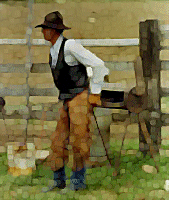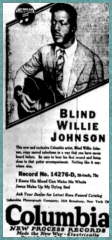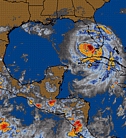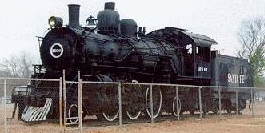
The James Alley Blues is song number 61 in the Harry
Smith Anthology. It was originally recorded by Richard (Rabbit) Brown
in New Orleans, LA, on March 5, 1927. Brown was one of the first
musicians to learn the twelve bar blues pattern, and was one of the most
important New Orleans folk singers to record. He was famous for his
dramatic guitar playing, which was similar in style to that of blues
man, Willie Johnson.
I have tuned to the key of the original recording which is somewhere
between C and C#, and have emulated the tempo, and blues licks Brown
played.
D
The times ain�t now nothin� like they used to be
G D
The times ain�t now nothin� like they used to be
A7 D
I�ll tell you the truth; won�t you take my word from me?
I�ve seen better days, but I ain�t puttin� up with these
I�ve seen better days, but I ain�t puttin� up with these
I had lot better times with the women down in New Orleans
Cause I was born in the country she thinks I�m easy to lose
Cause I was born in the country she thinks I�m easy to lose
She wants to hitch me to a wagon and drive me like a mule
I bought her a gold ring and I paid the rent
I bought her a gold ring and I paid the rent
She wants me to wash her clothes, but I got good common sense
If you don�t want me then why don�t you just tell me so?
If you don�t want me then why don�t you just tell me so?
It ain�t like a man got nowhere to go
I give you sugar for sugar, but all you want is salt for salt
I give you sugar for sugar, but all you want is salt for salt
If you can�t get along with me, then it�s you own fault
You want me to love you, but then you just treat me mean
You want me to love you, but then you just treat me mean
You�re my daily thought; you�re my nightly dream
Sometimes I just think that you�re too sweet to die
Sometimes I just think that you�re too sweet to die
And other times I think you ought to be buried alive
� 1998 McGuinn Music – Roger McGuinn










